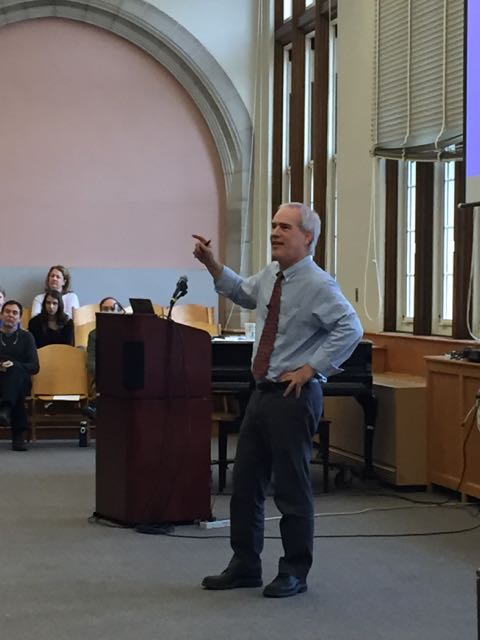High Schoolers Even More Stressed than Medical Students
- Wednesday, 30 March 2016 13:50
- Last Updated: Thursday, 31 March 2016 08:51
- Published: Wednesday, 30 March 2016 13:50
- Joanne Wallenstein
- Hits: 11978
 Dr. Stuart Slavin, Associate Dean for Curriculum at the St. Louis University School of Medicine brought surprising news to the staff of Scarsdale High School, who had gathered on March 24, their staff conference day, to listen to his findings on student stress and anxiety. Scarsdale teachers, deans and health professionals already knew that their high school students were stressed, but just how stressed?
Dr. Stuart Slavin, Associate Dean for Curriculum at the St. Louis University School of Medicine brought surprising news to the staff of Scarsdale High School, who had gathered on March 24, their staff conference day, to listen to his findings on student stress and anxiety. Scarsdale teachers, deans and health professionals already knew that their high school students were stressed, but just how stressed?
Slavin reported that he had done surveys of medical students and high school students, and much to his surprise he learned that high school students suffer from even more depression and anxiety than first year medical students. His work began with medical students and in 2014 he presented findings that showed that depression among medical school students is significant, affecting between 20 and 30 percent of medical students in the U.S., and potentially compromising their mental health for years to come. More recently, a study of 1,403 high school students in the Bay Area revealed that 54% showed symptoms of moderate to severe depression and 80% had moderate to severe anxiety. Slavin said, ""This is so far beyond what you would typically see in an adolescent population ...it's unprecedented."
But Slavin didn't come to Scarsdale only to validate the issue. He also delivered a hopeful message. The stress is not something we're powerless to control. He shared some successful and low-cost strategies that were used to reduce stress at the medical school and challenged the SHS staff to think about how they could implement similar tactics to improve the quality of life for students at SHS and possibly improve their academic results.
At the medical school, Slavin and his team allowed students to take some of the hardest courses on a pass/fail grading system. Human anatomy is one of the most difficult for new students and the school switched to pass/fail and found that students' anxiety decreased while their retention of important information increased. They also gave students more time to pursue their own interests and created small learning groups to strengthen connections. They looked at the curriculum to see if they could teach less material. According to Slavin, teaching "more does not always lead to a better outcome."
By making small changes, the faculty witnessed significant decreases in the anxiety level of the student body while at the same time, there was an improvement in the students' national board scores.
Slavin was so excited about the results that he shared what he learned with the administration of his daughter's high school in St. Louis where he served on the board. They listened but made no changes in their policy. He then went on to survey students at Irvington High School – in the Bay Area of California where he found that levels of anxiety and depression were higher among high school students than medical school students.
What were the causes of high school students' anxiety? Not surprisingly, the number one factor was the pressure to get into a prestigious college, followed by time pressure, pressure students put on themselves, pressure not to disappoint parents, fear about the amount of material students need to learn and competition.
Slavin believes the antidote lies in "cognitive restructuring," which involves changing the way students think and feel. He contends that "adolescents are filled with cognitive distortions," and that parents and teachers need to help them to change their emotional reactions to events. He emphasized mindfulness, reflection and resilience. According to Slavin, "Perfectionists have a much higher rate of anxiety and depression because they set the bar unrealistically high."
Stress-reducing tactics for the high school could include limits on the amount of homework, less testing and giving students time in school to study. Slavin also said parents should make sure their children get enough sleep and even permit them to miss a deadline if it gets in the way of sleep.
This talk was just one in a series to address student stress. On Wednesday April 6 at 7:30 pm, Vicki Abeles, who produced the movie "Race to Nowhere," and recently wrote "Beyond Measure" will speak at the Scarsdale Middle School about systemic stress, the obsession with achievement and the toll on student's well-being.






